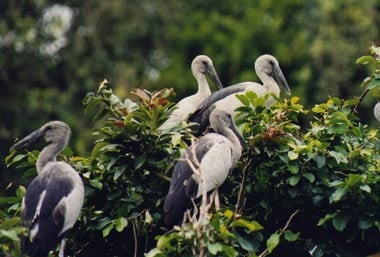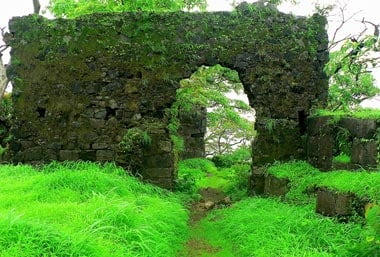This lush avifauna park, not too far out of Mumbai, is a birdwatcher’s dream. The dense forest cover here hides a plethora of birdlife, and is resplendent with colourful plantlife.
With its pure air and viridian surrounds, delightful little Karnala is a cure for tired senses, and a welcome respite from the frenzy and claustrophobia of Mumbai.
The sanctuary is centred round an old fort, after which it is named. Karnala Fort is situated on a rocky bluff (450m) and presents a scenic prospect of the surrounding countryside, and (if you’ve been rewarded with a bright and clear day) the Mumbai shoreline. The fort can be reached via a pretty, wildflower-blanketed trail.
History
Karnala and the area around has seen the advance of many an army. It was initially fought over between the Gujarat Sultanate (with the more-than-occasional help of the Portuguese) and the Nizam Shahis of Ahmednagar, before Shivaji and the Marathas took Karnala from the Portuguese. Following the death of Shivaji, the Mughals, under Aurangzeb, conquered it, after which it fell into the hands of the Peshwas, before ultimately coming under the British.
Geography
Forests (moist mixed deciduous), dotted with the patches of savannah.
Weather
Visit anytime between the months of July and March, though if you’re coming here purely from an ornithological point of view, from November to February is the best time of year, for it is during these months that you’re likely to spot the widest array of avifauna.
Flora and Fauna
Gorgeous Karnala has close to 200 species of birds, among them the Malabar whistling thrush, shama, paradise flycatcher, Shaheen Falcon, magpie-robin and racket-tailed drongo. In winters, migratory birds come calling from the Himalayas, the Western Ghats and the Deccan peninsula, including leaf warblers, blue-headed rock thrushes, drongos (grey and hair-crested), tree pipits, Nilgiri wood pigeons and grey-headed mynas.
Of the mammals, you will come across four-horned antelopes, muntjacs, jungle cats, wild boar, and also leopards.
There’s plenty of colour here, in the butterflies (glassy tiger, chocolate pansy, Blue Mormon, oakleaf, common mime) and the flowers and flowering trees (glory lilies, pink begonias, flame of the forest, coral and the Karvi shrub).
How to reach
The bird sanctuary is just past Panvel, on the Mumbai-Goa highway (NH17) – the highway splits the forest of Karnala. You can take a bus from Mumbai to Panvel, and a taxi or an auto from Panvel.
The closest airport is in Mumbai (62km), and the nearest railhead is at Panvel (12km).







 Share Via
Share Via


